Autos are worth watching as one sector where economic growth could resume first. But despite what others are saying, I don’t believe that it’s happening yet.
Some analysts seemed to take comfort in the fact that the decrease in auto sales from June 08 to June 09 was more modest than the year-over-year decline for earlier months had been. But that’s primarily a reflection of the fact that June 08 had been a significant deterioration relative to earlier months of 08.
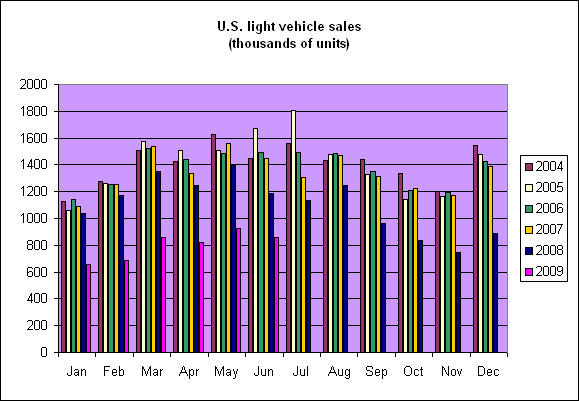 |
Americans bought fewer light vehicles in June 09 than they did in May 09, and that holds for every category– car or light truck, domestic or import. You’ll have to look elsewhere for your latest “green shoot” fix.
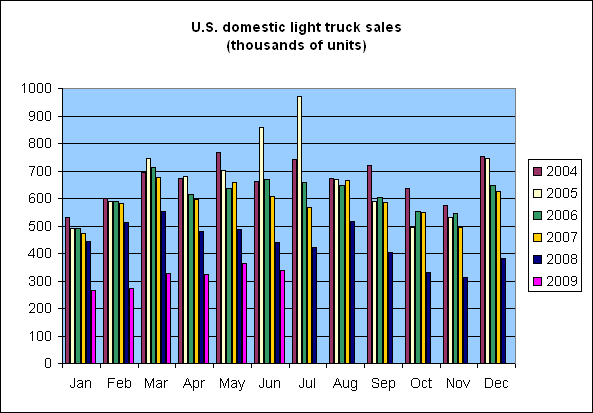 |
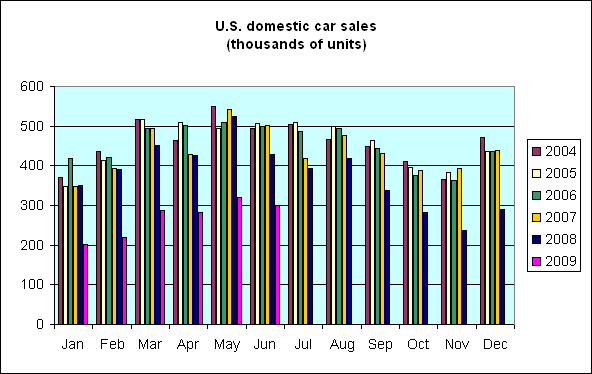 |
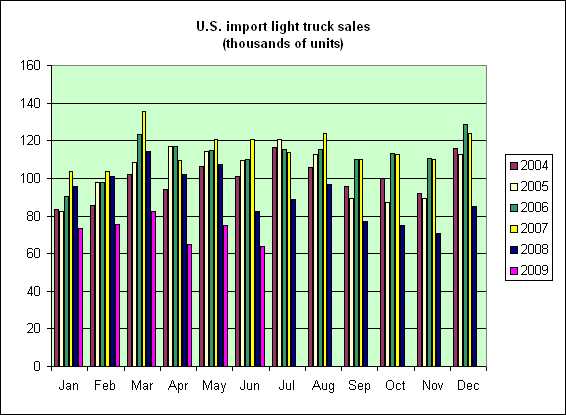 |
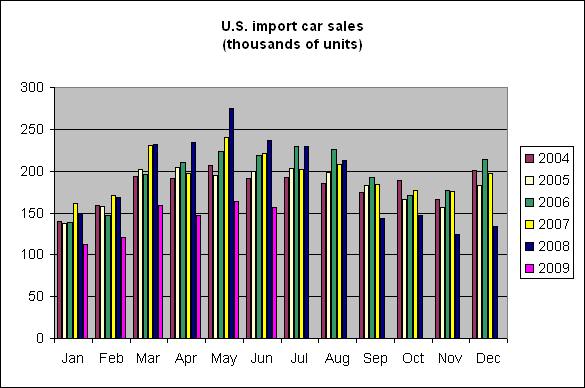 |
Agree completely.
I have not seen the data on fleet sales vs individual sales yet and that could hold some reason for hope in that the June drop was due to fleet sales by C & GM being disrupted by their
bankruptcy proceedings.
I do not give that possibility much weight.
I watch the commercials as a gauge of current auto sales and the Toyota, Honda and other’s ads and deals they are offering imply that at least the marketing departments of the auto companies
find the current level of sales disappointing.
You generally do not see turning points by looking at year-over-year comparisons. The quarterly rate of sales fell in every quarter of 2008 and 09Q1. It was positive in 09Q2 for the first time since 07Q4. Granted the rate of sales is very low, but this is a definite change for the better.
Doug – your statement is false. Year-over-year comparisons is to remove seasonality. If there are turning points (unrelated to seasonality), they should show up in the year-to-year too. In your example, if the 2009Q2-2008Q2 decline is smaller than the 2009Q1-2008Q1 decline, then there is change for the better. There is no situation under which month to month or quarter to quarter comparisons are warranted when there is clear seasonality. So Jim had it right.
We are finally in the quarter where the trough will occur :
1) Q309 NBER recession trough
2) 131M jobs at the bottom
3) UR rate crosses 10%
4) Jobless recovery in to 2010
I only owned one or two cars when I needed them for work, and even then the licensing people screwed me over. If I’ve just lost income I’d take public transit. If I’m a government I subsidize buses and passenger rail first. If I’m a really smart government I just buy Tata and Honda and subsidize local plants where the lobbying-for-SUV players should’ve died.
These numbers are almost low enough that I can see the difference in the import numbers for the car I bought last week!
Junkcharts,
You make a valid point about seasonally adjusted data. You should note that after seasonal adjustment, the selling rate in 09Q1 was 9.5 million and the rate in 09Q2 was 9.6. The decline 08Q1 to 09Q1 was 37.5% and the decline 08Q2 to 09Q2 was 31.9%. The decline without seasonal adjustment is also smaller. According to your definition, this is a change for the better, which was my point.
Homes and vehicles (cars/trucks/SUVs…) are a household’s two largest expenditures.
Right now, households are losing income through job loss, pay cuts, or cuts in hours worked. As Thursday’s numbers show, this situation is getting worse monthly. They are losing wealth as the value of their homes continue to deteriorate and the financial investments are way off from their highs two years ago. They are overextended in mortgage and personal debt as well. Wealth and debt are also continuing to worsen.
So what reason is there to believe they will be buying autos in any numbers soon?
I’d say the costs of health care and credit card debt are starting to rival the cost of auto ownership? Or at least to put auto ownership out of reach for more middle class folk.